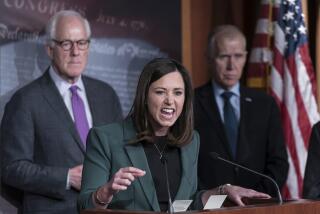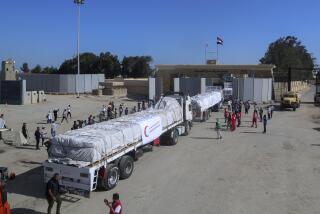Contra Aid: Bad Answer to Bad Question
One of my college professors repeatedly told his class: “To assure good answers, you must first ask good questions.”
The question of continued funding for the Nicaraguan Contras has, unfortunately, been so poorly framed over the years as to ensure only bad answers. The question becomes the foreign-policy equivalent of “Have you stopped beating your wife?”
The Reagan Administration has allowed the Contra question to eclipse broader questions of American foreign-policy goals in the Central American region, and Congress has been beguiled into debating the question on those limited terms.
In so doing, both Congress and the President have been backed into a “no win” corner. If military aid is approved this week, we risk undermining the diplomatic offensive that has achieved more in six months than military aid has accomplished in six years. Such approval would give the Sandinista regime an excuse to renege on its promises of political pluralism and the restoration of democratic processes.
On the other hand, a rejection of aid without qualification would send a signal to the Sandinistas that Congress and the President have reached a stalement on American policy toward Nicaragua. They would thus be tempted to disregard the promises made last August and expanded upon two weeks ago in Costa Rica.
Either way, the Sandinistas win, because the question has been improperly framed from the beginning. And Congress faces the dilemma of either reaffirming bad policy or rejecting it and creating the vacuum of having no policy at all.
Hopefully, the answer to this imprudent ultimatum will be yet another reprieve through an unglamorous compromise that segregates Contra support into non-lethal and lethal-aid packages, fencing off release of the latter for subsequent congressional consideration.
Such an arrangement would allow one more chance, perhaps the last, to return the Contra caboose to the back of the policy train where it belongs, and enable the Administration to forge a truly bipartisan, multidimensional and multilateral approach to the Nicaraguan issue. Three critical dimensions of our Central American policy need to be resolved:
--An honest attempt must be made to root that policy in genuine bipartisan consensus. Bipartisanship means more than simply securing the magic number of “swing” votes needed to join the majority of Republicans supporting the President on the issue. It means a jointly formulated policy in which there is a sense of shared ownership sufficient to engender a shared obligation to defend it domestically and aboard. Dividing Congress and the nation with “good guy-bad guy” rhetoric over charges of neo-isolationism or naivete regarding Marxist regimes can only serve to undermine this effort. Members of Congress ought not to usurp the role of secretary of state. But implementing foreign policy in the absence of reasonable political accommodation denies the stable and predictable foundation upon which foreign policy consensus must be built.
--Our Central American policy must be explicitly multidimensional. If continued democratization of Latin American societies is to be nurtured, policies addressing the problem of the drug warlords, the burgeoning Latin populations, the restructuring of Latin American debts and revitalization of Latin American economies must be given just as dramatic a focus and attention as the effort to counter Marxist subversion and presence in the region. We must rigorously examine the impact that our policies may or may not be having in inadvertently remilitarizing the very region in which we are trying to sustain the growth of fragile civilian political institutions.
--Our Central American policy must deliberately seek to strengthen multilateral participation of the region’s nations. A sense of shared ownership of that policy is no less important to those affected by it than it is to those conducting it. Last fall, while Congress was once again debating additional millions to the Contras, the State Department advised the Organization of American States that the United States could not afford to meet its financial obligations to host the annual OAS meeting. And of course, it goes without saying that a Central American policy is doomed to failure if it runs counter to the joint efforts of the Central American presidents to develop a regional solution to their problems.
As long as policy-making is determined by lurching from Contra aid request to Contra aid request, there is little in the way of meaningful discussion and agreement on the broader goals and purposes of our policy in Central America, and how and when military force might be used to achieve them. In the present context of the diplomatic initiative undertaken by the Central American presidents, the continued fixation on further funding of the Contras is even less adequate as a substitute for a broader policy. Until we begin to ask the right questions, we shall be frustrated with a policy process that yields only bad answers.
More to Read
Sign up for Essential California
The most important California stories and recommendations in your inbox every morning.
You may occasionally receive promotional content from the Los Angeles Times.










